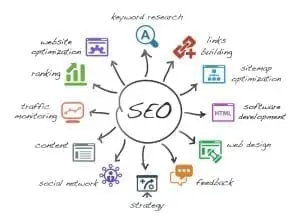
SEO has slowly evolved for decades and is very different than just a few years ago. Every time search engines update their algorithms, SEO changes. Today, businesses should focus on organizing content in topic clusters supported by long-tail keywords, and on backlink domain authority.
On-Page SEO
On-page SEO is the optimization of individual web pages to rank higher in search engines and earn more relevant traffic, whereby leads and online sales can be generated. On-page SEO includes content, internal link building, HTML source code, website architecture, etc.
Topic Clusters: Organizing Content into Topics and Subtopics, Using Long-Tail Keywords
Keywords were the hidden treasure of SEO for many years. In 2018, however, this is no longer the case. Today, it’s more effective to focus on organizing content by topic, which helps search engines understand a user’s intent. Secondly, each topic is broken down into subtopics.
Each topic with its associated subtopics constitutes a topic cluster.
- Each topic cluster has a main page, also called a core topic page or pillar page. The main page of the topic is rather general, and links to the subtopic pages drive users deeper into the site.
- Each subtopic has a page that links to the core topic page and links to other relevant subtopic pages.
The topic cluster SEO model, therefore, organizes a website with topics and subtopics, supported by long-tail keywords and internal linking between pages.
Create and Maintain a Blog
Blogging is still one of the top ways to help improve a website’s ranking in search engines.
Structure blog categories to mirror the main topics and subtopic clusters of the website as discussed above. However, don’t be concerned about using exact-match keywords, which can become spammy. Search engines like Google are sophisticated enough to corollate closely-matched keywords and understand a website’s structure.
Blogs also present excellent opportunities to create strong internal links. Appropriately link each blog to the core topic page and associated subtopic pages. And as new content is added to the website, occasionally review older articles and update internal links to take advantage of interlinking opportunities.
Furthermore, blogs should be updated as needed to remain relative, which will improve the page authority. Regular updates also improve the visibility of your blog and will help you stay top of mind with your audience.
Off-Page SEO
Off-page SEO refers to actions taken outside of your website that impact search engine rankings. Off-page SEO includes backlinks, mentions on other websites, creation, and optimization of social profiles, social signals, etc.
Backlinks
External link building (backlinks) remains one of the most important facets of off-page SEO, but it has changed significantly in recent years. The number of inbound backlinks is not as important as the authority of the sites linking to your website. Furthermore, whether the backlink is follow or nofollow is less important than in past years.
A modern SEO strategy focuses on high quality, authoritative backlinks rather than a greater number of low-quality links. One backlink from a highly authoritative website carries more weight than thousands of low-quality backlinks.
Track Key SEO Metrics
Monitoring and tracking key SEO metrics related to on-page and off-page SEO is critical. The metrics show the progress with search engine rankings, Furthermore, the metrics enable marketers to quickly analyze the effects of changes in search engine algorithms, while providing tools to test which SEO strategies work best for a website.
Key SEO metrics include:
- Leads and sales.
- Organic traffic, bounce rate, and conversion rate.
- Keyword rankings.
- Backlinks and referring domains.
- Social signals, including reviews.
- Local visibility.
- Click-through rate (CTR).
- Pages per session.
- Average page load time.
- Top exit pages.
- Pages indexed in Google Search Console.
- 404 errors.
- Crawl errors.
- Empty or duplicate titles and descriptions.
- Image empty alt text.
The best tools for tracking SEO metrics include:
- Google Analytics
- Google’s Webmaster Tools
- SEO PowerSuite
- SEMrush
- Moz’s Pro Tool
- Ahrefs
- SMclicks
Take Away
SEO is different from years ago when marketers focused on keywords and low-quality backlinks. Today, businesses should be focused on organizing content in topic clusters supported by long-tail keywords, and backlink domain authority.
And more than ever, it’s important to track key SEO metrics to ensure the progress of your SEO strategy and catch errors before they negatively impact SEO.
For analysis of your website, including key SEO metrics, please schedule a free consultation or contact us direct.
